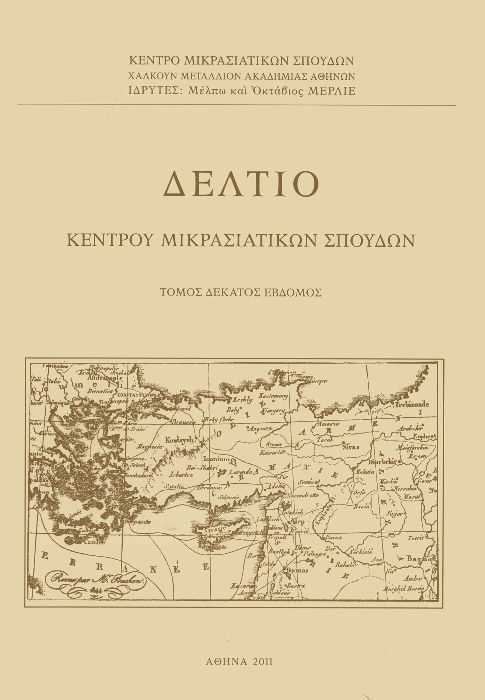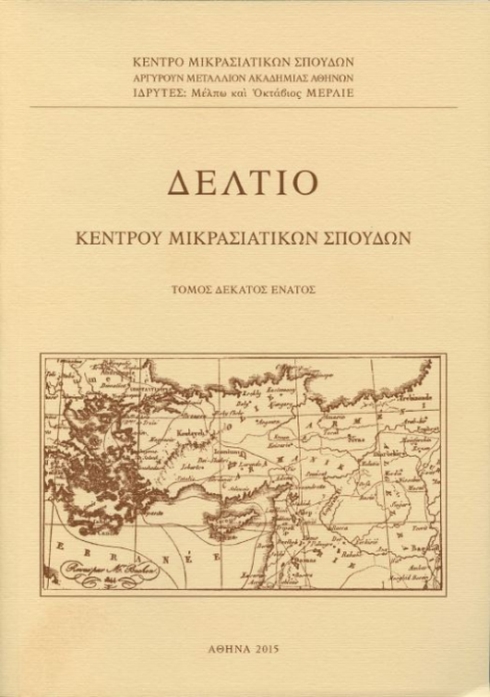Από "Σωτήρας της φυλής", "ευεργετής των Τούρκων": Ο Βενιζέλος και η εθνικιστική ηγετική ομάδα των Ρωμιών της Κωνσταντινούπολης, 1918-1930
Περίληψη
The aim of this article is to present the development of the relations between Eleftherios Venizelos and the nationalist leadership group of the Greek Orthodox community of Istanbul during the period 1918-1930. The term ‘nationalist' refers to the faction that had ethnocentric ideological orientations and made political claims on the basis of the community’s Greek ethnic identity. At the outset, the analysis will focus on the public identification of the Greeks of Constantinople with the Greek statesman and the irredentist policy of the Megali Idea. This process could be divided into two major stages: The nationalists' organized efforts to severe the community's ties with the Ottoman establishment, while manifesting their desire for union with Greece and the politicization of the Constantinopolitan Greeks, expressed by their support to Venizelos in his dispute with King Constantine and the anti-Venizelists. In this context, emphasis will be given on the activities of the Ecumenical Patriarchate, the Permanent National Mixed Council, the Greek press in Constantinople and the several communal committees and associations in an attempt to explain how and why Istanbul embraced Greek irredentism and became the stronghold of Venizelist opposition to royalist Athens. Furthermore, the article will examine the policies of the nationalists after they fled the collapsing Ottoman Empire in late 1922. Although, according to the terms of the Treaty of Lausanne (July 1923), these non-exchangeable Greeks of Constantinople were entitled to return to Istanbul, the Turkish authorities did not allow them to exercise this right. As a result, these 'absent' Greeks gradually reconstructed their social, political and economic network in Greece, assuming the role of an authority in exile for the Rums who remained in Istanbul. The article will attempt to assess this group's response to Venizelos* return to politics in 1928. It will be argued that his new policy of reaching an agreement of friendship and cooperation with Turkey in the late 1920s divided the ’absent' Greeks, resulting finally in the public denouncement of the Greek politician as a ‘benefactor of the Turks' by a fraction of their leadership.
Λεπτομέρειες άρθρου
- Πώς να δημιουργήσετε Αναφορές
-
Καμούζης Δ. (2011). Από "Σωτήρας της φυλής", "ευεργετής των Τούρκων": Ο Βενιζέλος και η εθνικιστική ηγετική ομάδα των Ρωμιών της Κωνσταντινούπολης, 1918-1930. Δελτίο Κέντρου Μικρασιατικών Σπουδών, 17, 151–193. https://doi.org/10.12681/deltiokms.14
- Τεύχος
- Τόμ. 17 (2011)
- Ενότητα
- Άρθρα

Αυτή η εργασία είναι αδειοδοτημένη υπό το CC Αναφορά Δημιουργού – Μη Εμπορική Χρήση – Παρόμοια Διανομή 4.0.
Οι συγγραφείς των άρθρων που δημοσιεύονται στο Δελτίο διατηρούν τα δικαιώματα πνευματικής ιδιοκτησίας επί των άρθρων τους, δίνοντας στο περιοδικό το δικαίωμα της πρώτης δημοσίευσης. Άρθρα που δημοσιεύονται στο Δελτίο διατίθενται με άδεια Creative Commons 4.0 και σύμφωνα με την άδεια μπορούν να χρησιμοποιούνται ελεύθερα, με αναφορά στο/στη συγγραφέα και στην πρώτη δημοσίευση για μη κερδοσκοπικούς σκοπούς και με δικαίωμα τροποποίησης μόνον με παρόμοια διανομή (αν αναμείξετε, τροποποιήσετε, ή δημιουργήσετε πάνω στο υλικό, πρέπει να διανείμετε τις δικές σας συνεισφορές υπό την ίδια άδεια όπως και το πρωτότυπο).



